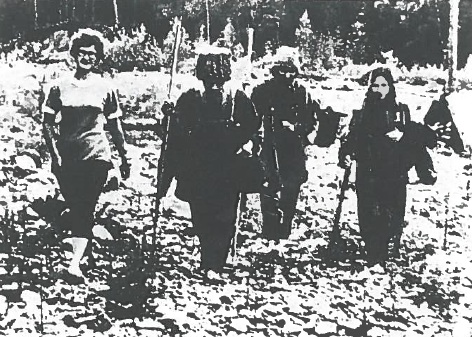In 1978, Soviet geologists were stunned while exploring the remote Siberian taiga when they happened across a deeply religious family that had retreated 40 years earlier from their country’s attempts at modernization, as well as all outside human contact and communication. They were so isolated that they were blissfully unaware of that horror known as World War II. From Mike Dash at the Smithsonian site:
“Slowly, over several visits, the full story of the family emerged. The old man’s name was Karp Lykov, and he was an Old Believer—a member of a fundamentalist Russian Orthodox sect, worshiping in a style unchanged since the 17th century. Old Believers had been persecuted since the days of Peter the Great, and Lykov talked about it as though it had happened only yesterday; for him, Peter was a personal enemy and ‘the anti-Christ in human form’—a point he insisted had been amply proved by Tsar’s campaign to modernize Russia by forcibly ‘chopping off the beards of Christians.’ But these centuries-old hatreds were conflated with more recent grievances; Karp was prone to complain in the same breath about a merchant who had refused to make a gift of 26 poods [940 pounds] of potatoes to the Old Believers sometime around 1900.
Things had only got worse for the Lykov family when the atheist Bolsheviks took power. Under the Soviets, isolated Old Believer communities that had fled to Siberia to escape persecution began to retreat ever further from civilization. During the purges of the 1930s, with Christianity itself under assault, a Communist patrol had shot Lykov’s brother on the outskirts of their village while Lykov knelt working beside him. He had responded by scooping up his family and bolting into forest.
Peter the Great’s attempts to modernize the Russia of the early 18th century found a focal point in a campaign to end the wearing of beards. Facial hair was taxed and non-payers were compulsorily shaved—anathema to Karp Lykov and the Old Believers.
That was in 1936, and there were only four Lykovs then—Karp; his wife, Akulina; a son named Savin, 9 years old, and Natalia, a daughter who was only 2. Taking their possessions and some seeds, they had retreated ever deeper into the taiga, building themselves a succession of crude dwelling places, until at last they had fetched up in this desolate spot. Two more children had been born in the wild—Dmitry in 1940 and Agafia in 1943—and neither of the youngest Lykov children had ever seen a human being who was not a member of their family. All that Agafia and Dmitry knew of the outside world they learned entirely from their parents’ stories. The family’s principal entertainment, the Russian journalist Vasily Peskov noted, ‘was for everyone to recount their dreams.'”

